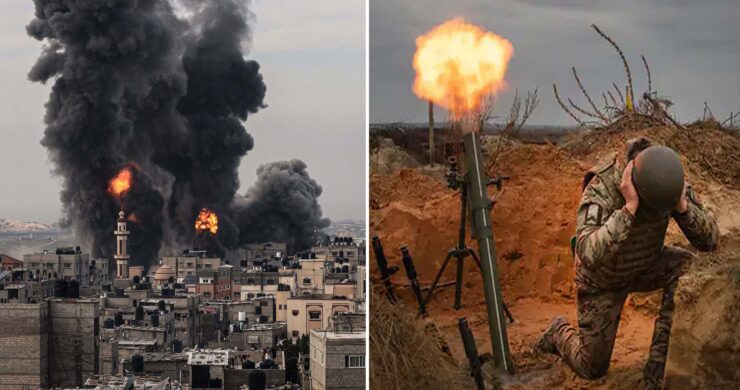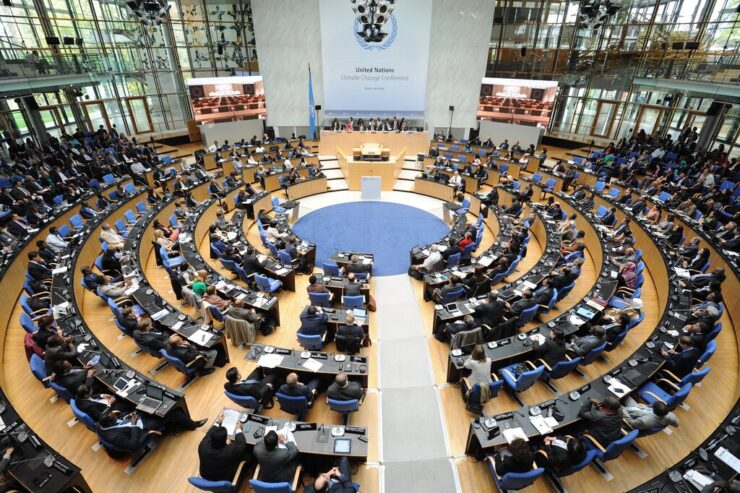
As we usher in 2024, the world finds itself at a crucial juncture in history, characterised by shifting power dynamics, emerging challenges, diverse conflicts, and unprecedented opportunities. The emergence of 21st-century multipolarity and multi-engagement, with geopolitical power becoming more dispersed, is a stark reality. Alongside de-risking and strategic autonomy, the new mantra will be based on the lessons of 2023, with countries seeking to reduce global dependencies, prioritise national security over purely economic considerations, and diversify risks in temporal terms.
A series of political, social, societal, technological, and ideological storms have shaken the global equilibrium of peace, giving rise to instability through war and violence. Policy objectives have transformed from the pursuit of peace to seeking justice through war. Ironically, both approaches are increasingly proving unsuccessful. The future trajectory will unfold against the backdrop of unprecedented devastation, division, and instability, as 27 regions experience massive violence and political insecurity. This accounts for a third of the world’s population residing in conflict zones.
Grappling with New Challenges
The geopolitical landscape in 2024 is poised for transformation through the recalibration of global power equations, posing challenges to peace and stability. Key players such as the United States, China, and Russia will navigate this terrain through collaboration, competition, and potential geopolitical confrontations. Emerging forces like India, Brazil, and select African nations are set to assert themselves economically, politically, and diplomatically, transitioning from rule takers to rule shapers. This shift demands adept diplomacy and strategic collaboration to address global challenges, including conflicts, the economy, climate change, terrorism, and pandemics.
The rise of a dominant China raises concerns and injects instability into changing regional and global geopolitical dynamics. China’s economic prowess, technological advancements, military assertiveness, and weaponised foreign policy across land, sea, and space are causing significant geopolitical ripples. Similarly, Russia’s geopolitical revanchism and influence in regional conflicts, combined with its energy resources, contribute to the rebalancing of power, resulting in the emergence of new power blocs. The delicate transition from an established to an emerging geopolitical order necessitates a nuanced approach to navigate potential instabilities and construct a more inclusive world.
The Year of the Ballot
In 2024, major elections worldwide will shape the geopolitical landscape. A staggering 76 countries will conduct elections at various levels, involving approximately four million voters—equivalent to half of the world’s population. While the year holds the promise of change, realising it necessitates persuading, incentivising, and encouraging people to vote. The future belongs to those who can lead transformative change, addressing global challenges in a coordinated manner through visionary leadership.
Oceans Take Geostrategic Prominence
The geopolitics of the oceans will significantly influence the global arena in 2024. Not only do oceans harbour 94 per cent of all life on our planet, but they also serve as an increasingly vital economic and national security resource. An important statistic reveals that a staggering 90 per cent of global goods trade relies on maritime routes, emphasising their critical role in international commerce. Predictions indicate that deep-sea mining will play a substantial role, contributing at least one-third of the essential minerals crucial for the ongoing energy transition. However, the world’s busiest maritime transit corridors face potential geopolitical disruptions. Consequently, nations must incorporate ocean geopolitics into their strategic considerations for national security and economic planning.
Policy objectives have transformed from the pursuit of peace to seeking justice through war. Ironically, both approaches are increasingly proving unsuccessful. The future trajectory will unfold against the backdrop of unprecedented devastation, division, and instability, as 27 regions experience massive violence and political insecurity. This accounts for a third of the world’s population residing in conflict zones
Climate Change Imperatives: A Global Crisis Unfolding
The paramount challenge of the future remains climate change, necessitating urgent and sustained collaborative efforts. The harsh reality of ecological imbalance, escalating climate-related disasters, rising sea levels, and disruptions to ecosystems presents profound challenges. The imperative is a collective endeavour to reduce greenhouse gas emissions and adapt to a green environment transformation.
The global community must collaborate on innovative solutions, such as carbon capture, renewable energy, and sustainable green practices, to address the pressing challenges of climate change. The transition to a low-carbon-oriented green economy presents both geopolitical challenges and opportunities. It requires a proportional international commitment to ensure a just and equitable transition for all nations.
Navigating the Fourth Industrial Revolution
The rapid pace of technological advancement, encompassing artificial intelligence (AI), quantum computing, and biotechnology, brings with it both promise and perils. The Fourth Industrial Revolution is reshaping industries, economies, militaries, and societies worldwide. The convergence of AI with disruptive technologies like augmented reality, blockchain, and the Internet of Things (IoT) is shaping a dynamic technological landscape. Generative AI has the potential to automate up to 40 per cent of the average workday, leading to enhanced productivity gains but also posing challenges related to workforce reduction and associated unemployment concerns.
The geopolitics of AI will intensify, marked by increased competition to mitigate risks and foster domestic AI innovation for national growth. This transformation has redefined the global landscape, and with the simultaneous surge in globalisation and technology, a new term—‘geotechnology’—has emerged as a significant factor in global power dynamics.

In 2024, cybersecurity will emerge as a critical aspect of national security. The growing frequency and sophistication of cyberattacks pose threats to national security, economic stability, and individual privacy. Nations must collaborate on robust cybersecurity measures, share intelligence, and establish international norms to effectively prevent and respond to cyber threats.
Global Health Security Challenges
The COVID-19 pandemic has underscored the critical importance of global health security. In 2024, nations will continue to grapple with the ongoing challenge of managing the aftershocks of the pandemic, its variants, and preparing for future health crises as integral components of national security. Prioritising inclusive healthcare and investing in robust public health infrastructure is imperative for building resilience against potential threats in the future.
International collaboration will be essential for research, data sharing, and the establishment of early detection systems to effectively mitigate the spread of infectious diseases. Strengthening the World Health Organization (WHO) and revitalising other global health institutions can enhance their capacity to coordinate global responses and mitigate health emergencies.
Economic Resilience and Inclusion
Addressing global economic challenges necessitates a comprehensive and inclusive recovery approach. Nations must prioritise economic resilience by implementing fiscal policies that stimulate growth, support businesses, and protect vulnerable populations.
The widening income inequality, accentuated by the pandemic, calls for targeted policies to ensure inclusivity and social justice. Investments in education, healthcare, and social safety nets can address the root causes of inequality, fostering a more equitable distribution of resources and opportunities. Additionally, international cooperation in trade and investment is essential for global economic recovery, as protectionist measures and sanctions can hinder growth and exacerbate economic disparities.
Political Stability and Fostering Global Peace
Political stability and the resolution of regional conflicts remain crucial for global peace and security. In 2024, diplomatic efforts aimed at addressing longstanding disputes, promoting democracy, and protecting human rights are central to fostering a stable international order. The role of multilateral institutions, such as the United Nations (UN) and regional organisations, becomes increasingly important in mediating conflicts and upholding international norms. Their structures, with roots in history, should evolve to be both inclusive and respected worldwide, avoiding manipulation by powerful entities to define and redefine rules. The international community must collaborate to prevent and resolve conflicts, support peacekeeping efforts, and address the root causes of instability, including poverty, inequality, radicalism, terrorism, and territorial disputes.
The rise of a dominant China raises concerns and injects instability into changing regional and global geopolitical dynamics. China’s economic prowess, technological advancements, military assertiveness, and weaponised foreign policy across land, sea, and space are causing significant geopolitical ripples. Similarly, Russia’s geopolitical revanchism and influence in regional conflicts, combined with its energy resources, contribute to the rebalancing of power, resulting in the emergence of new power blocs
United Nations Summit of the Future
The United Nations Summit of the Future, scheduled for September 23-24, 2024, offers a unique opportunity for global leadership post-election. Building upon the Sustainable Development Goals (SDG) Summit, the aim is to deliver an action-oriented pact for the future to accelerate progress towards the SDGs. Engaging in a transformative way across all entry points is essential to impact all 17 SDGs. Unfortunately, as of September 2023, only 15 per cent of the goals were on track for the 2030 deadline. The Future Summit will need to re-strategise and reprioritise to address these challenges. As the Deputy Secretary-General notes, “There is no peace without sustainable development, and there is no development without peace.”
Key Takeaways
The year 2024 emerges as a crucial juncture in human history, where the decisions made by nations will wield a profound influence on the future course of global affairs and peace. The intricate interplay of shifting power dynamics, climate imperatives, conflicts, technological advancements, and geopolitical challenges necessitates a collaborative and innovative approach.
In the face of inevitable uncertainties and the intricacies of geopolitical changes, global collaboration through proactive strategies can effectively navigate complexities, fostering resilience and stability in this dynamic geopolitical landscape. To tackle shared challenges and propel global progress, obsolete silos must be dismantled, and novel pathways of transformative thinking leveraged.
-The author is a PVSM, AVSM, VSM has had an illustrious career spanning nearly four decades. A distinguished Armoured Corps officer, he has served in various prestigious staff and command appointments including Commander Independent Armoured Brigade, ADG PP, GOC Armoured Division and GOC Strike 1. The officer retired as DG Mechanised Forces in December 2017 during which he was the architect to initiate process for reintroduction of Light Tank and Chairman on the study on C5ISR for Indian Army. Subsequently he was Consultant MoD/OFB from 2018 to 2020. The Officer is a reputed defence analyst, a motivational speaker and prolific writer on matters of military, defence technology and national security. The views expressed are personal and do not necessarily carry the views of Raksha Anirveda








